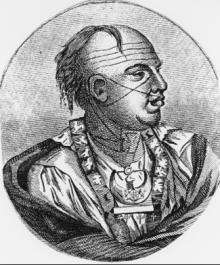
Words for Warriors-- Dahnawa Danatlihi
Jan 11, 2016
The Cherokee word for warrior, Dahnawa Danatlihi, literally means “War They-Are-Running-Place.” One way to translate that would be “They run to the place of war.” Or you could say, “Where they run is war.”
In the 1700s, Cherokee men fasted four days and made medicine, and then took off running to war. They ate parched corn and dried venison, and took very little with them besides their weapons. They ran as much as a hundred miles a day to go fight, and then ran home. (More on Cherokee running in a future blog.)
Today people talk about tribal council members being “warriors” because they work with federal and state governments to maintain tribal sovereignty, and try to take care of the people. Others talk about being a “warrior for the culture” by learning native language, doing traditional dances, practicing the old ways, and passing them on. People talk about being a “true warrior” by taking responsibility and taking care of yourself, your family, your clan, and your tribe.
These are all important, and people have to be strong and dedicated to do these things. But they are not taking off running anywhere. Cherokee and other American Indian people are serving in the U.S. military in Afghanistan and around the world. They didn’t run to get there, either, although they traveled far.
The meaning of being a warrior has changed, and the actions have changed, but the Cherokee word still has the old meaning, describing what people did when they went to war. When using old words in modern times, it’s important to know their real meanings, so that they can be applied correctly. Otherwise Cherokee becomes like English, where “warrior” is just a label, without any real meaning. With the old meanings, the language stays alive and connected to the past.
Illustration: Ostenaco in 1762 in London. "Outacite" may be a garbled form of Asgayadihi, Mankiller, one of the ranks of warriors.

